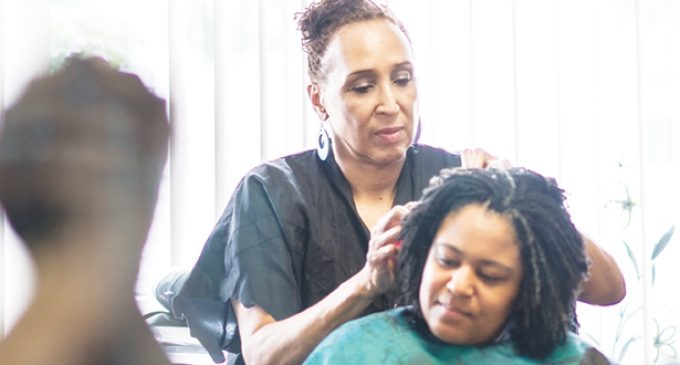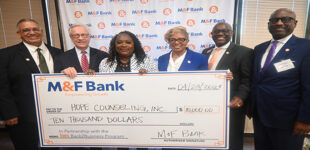African-American women in charge speak about natural hair

In above photo: Ayana Hardin creates natural hair twists. (Photo by Erin Mizelle for the Winston-Salem Chronicle)
Editor’s note: This is the last part of a two-part series.
By Felecia Piggott-Long, Ph. D.
For The Chronicle
Today, it is not surprising to see women sporting kinky twists, locks, Nubian Knots, braids, afro puffs and even afros in the workplace.
What’s striking is that many of the black women wearing the natural styles are women in charge.
Following are a few such women in the Winston-Salem Triad area:
Sylvia Sprinkle-Hamlin, library director for Forsyth County Public Library System and Executive Producer of the National Black Theatre Festival, has had many hairstyles.
She has had perms, worn wigs, sew-ins, short cuts and long styles.
Having grown up in Tobaccoville, she also wore her natural hair in the 1960s, ’70s, ’80s and ’90s.
Ayana Harding of Ayana’s Glory Locs maintains Sprinkle-Hamlin’s locs.
“Natural hair is easy to maintain, and there are so many styles that can be created with natural hair, Sprinkle-Hamlin said. “Hair doesn’t determine whether you are professional or not. It should always be neat and clean. Wigs, weaves and sew-ins are up to the individual. Whatever makes one feel beautiful.”
Bennett College President Rosalind Fuse-Hall received her first perm in 1977, but her inspiration to go natural came from her bout with lymphoma when she was 25 years old.
She was at Rutgers School of Law at that time in 1983 when she received her first diagnosis.
She studied Criminal Justice at the University of North Carolina at Chapel Hill, where she wore her hair in a perm, in curls, an Afro, cornrows and a curly perm.
Her radiation treatments did not affect her hair loss, but her second bout with the illness and the chemotherapy treatments caused her hair to fall out.
For six months, she had to wear a wig because she was bald.
When her hair grew back, it was “fine like baby hair, and I wore my hair in a short natural. … I felt very empowered about going natural. Even though I am no longer sick, it is a conscious decision, and I feel comfortable. I get lots of compliments on my natural hair. I have determined for myself that it is part of my beauty,” Fuse-Hall said. “I came of age during the Black Power Movement of the 1970s. Angela Davis was positive affirmation for me. Dr. Johnetta B. Cole, Dr. Julianne Malveaux, Viola Davis, Thadious Davis, Alice Walker, Dr. Trudier Harris and Dr. Sonya Stone. These are all beautiful women.”
Dr. Trudier Harris was J. Carlyle Sitterson Distinguished Professor of English and Comparative Literature at the University of North Carolina at Chapel Hill when she retired from UNC-Chapel Hill in 2009 and became professor of English at the University of Alabama in 2012.
In April 2015, she was appointed University Distinguished Research Professor at the University of Alabama.
She wrote a book titled “Summer Snow: Reflections from a Black Daughter of the South,” published in 2007.
Harris says, “My natural hair, obviously, has not in any way been a hindrance to my career.”
Harris has only had one perm, in 1982.
“I let it stay for a couple of weeks before trying desperately to get rid of it. I didn’t like the way it felt or the maintenance required,” Harris said. “I started out in graduate school with an Afro, which, over the years, I alternated with a Jheri Curl … I had locks from 1993-1996. I finally settled into a short Afro, which I like very much.”
Harris recalls that a woman approached her in Atlanta and praised her for her beautiful locs.
Harris’ goal is to avoid “self-negation,” whether women choose to wear wigs or weaves for convenience.
“Some African-American women are risking their health for the sake of their hair. They refuse to exercise because it would make them sweat, and they don’t want to sweat out those expensive perms or run the risk of displacing their weaves.” Harris said. “Some high-profile African-American women seem not to be convinced that their publics will accept them as they truly are, which means that hair politics remain rooted in the racism that undergirds just about everything in America – and throughout the world.”
Two women with high-profile positions at Winston-Salem State University are RaVonda Dalton-Rann, executive assistant to the chancellor and secretary of the University, and Dr. Brenda Allen, provost and vice chancellor for academic affairs, and chief academic and budget officer.
Dalton-Rann has held her position for 20 years.
Although Dalton-Rann had processed hair while growing up for 20 years, she has been a natural-hair woman for 40 years.
She has always believed that natural hair is professional.
Joel Cudworth, a white male who styled hair for the Ebony Fashion Fair, styled her first natural.
Cudworth also taught cosmetology at Dudley’s Beauty School in Greensboro for several years.
He still owns a shop in Greensboro.
Dalton-Rann’s greatest cheerleader for her being a natural woman is her husband of 30 years, Emery Rann III. She was natural when they first met.
“He tells me all the time that my choice was one of the things that attracted it to him. He knew immediately what it meant and he still understands that it is a political statement,” Dalton -Rann said. “It allows me to be who I am without even opening my mouth. It is a political statement, and it is also who I am. Role models such as Angela Davis, Nikki Giovanni and Toni Morrison have inspired my choice.”
Allen wore her hair permed for most of her adult life with a few stints with braids during her 30s. She has only been natural for three years.
“All of the women in my family converted to natural hair during their 50s. It was just a family trend that I followed. In its current state, my hair reflects the diverse beauty of hair texture inherited by black women throughout the Diaspora,” Allen said. “Older women in my family have beautiful natural styles. I have just returned to my roots and family tradition.”
Allen does not ever plan to have her hair permed again because she is very satisfied with her professional, natural styles.
“Professional has many looks. In the world of work, being well-groomed is important. … We never talk about natural for someone not of African descent. Every other woman who is not black or whose hair texture is not curly/kinky is never questioned about the acceptance of their natural state,” Allen said. “Whether you port a fro or locks and twists, I don’t think you will defy professional if your hair is well-groomed. When someone says your ‘natural’ look is not professional, we must understand that as code for a different conversation.”
“Women are returning to natural hair for many personal reasons. For some, it is the style of today. People without naturally curly hair are buying or processing toward the look,” Allen said. “For others, it might be about ease of grooming, especially as fitness has become important.”
Allen said she has never been criticized for her natural style, only praised.
“My natural is not a political statement. In the words of India Arie, ‘I am not my hair.’ I feel no different when my hair is curly or straight.”
Another public figure is Kenyatta Richmond, the Basileus of the Phi Omega Chapter of Alpha Kappa Alpha Sorority Inc.
In the workplace, she is the coordinator of community outreach and engagement at Family Services, where she conducts workshops and training sessions on the issues of domestic and sexual violence.
She received her first relaxer when she was 9 years old.
She kept the relaxer until she was 42.
“For the most part, the relaxer was OK for me, until I got older and started to lose hair due to medications and the chemicals I was putting in my hair. I did the big chop in December of 2013. I loved my hair from the first day that I cut it off,” Richmond said. “I decided to go natural because of the breakage and damage to my hair. I got tired of trying to cover it up and allowing my hair to dictate how I felt on any one particular day. Wearing my hair natural made me feel free. I didn’t feel tied to a stereotype of what beauty is supposed to be. I felt good about embracing my natural God-given beauty from root to tip,” Richmond said. “Some men do not like the natural state, especially when it was shorter. They felt like it wasn’t feminine enough for them.”
Brandy Rowland is a personal banker at Wells Fargo Bank.
She is currently studying for a business administration/finance degree from Salem College.
She had a perm from the age of 9 until she was 26, when she and her husband, Jamarius, had a set of twins, Tamera and Tatiana.
Her husband loves her new look.
“It fits her. I love the color and the flexibility of it. It works for her and me,” he said. “When I met her, she had long hair hanging down her back, but when she came back from the stylist with her new look, it was a pleasant surprise.”
She has been praised and criticized for her natural look.
She has been married for six years.
“I have two 5-year-old daughters. I am currently teaching them to love their hair and to be one with their hair,” Rowland said.
JaMonica Barson is a licensed mental health counselor for DayMark Recovery Services in Wentworth, N.C.
She has had a perm periodically but stopped getting them because of the rising costs.
She loved color with her perms, and the combination created breakage.
She now wears a brush cut that is very closely cropped.
“I get tons of compliments at work, never any criticisms. Most of my criticisms have come from older generations. My friends love my natural hairstyles,” Barton said. “My mate did not like my natural. I think it has a lot to do with conditioning. If you are conditioned to think that European is the better standard of beauty, then you are not going to like natural hair,” Barson said. “Natural hair definitely makes me feel empowered. I feel like I can do anything and feel like it lets others know that I’m confident in who I am.”
Purity Njoui Waithanji-Ruchugo is an ordained minister, businesswoman and the founder of Sister2Sister International Outreach Ministry Inc.
Her shop, called Umoja African Crafts, is on North Trade Street in downtown Winston-Salem.
She has been natural for 10 years.
Sister2Sister International Outreach Ministry Inc. is empowering women through training in entrepreneurial skills, and is working with over 100 orphans in Kenya.
Ruchugo’s short Afro is easier to manage while traveling back and forth from Kenya to the United States.















